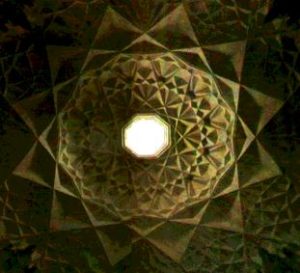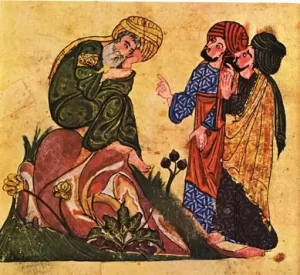Ahmad Farouk Musa & Piet Hizbullah Khaidir || 11 March 2024
Harun Nasution’s Sufism
 Does the rationality of Nasution’s Islamic thought prevent him from practicing sufism? When we examine the book Philosophy and Mysticism in Islam, sufi practices (also known as sulūk)[1] promoted by him is a form of philosophical sufism. Sufi teachings emphasise the knowledge and spiritual application of concepts such as maḥabbah (love), ma’rifah (interior knowledge or mystical knowledge of God), fana’ (the complete denial of self and the realisation of God), and baqā’ (subsistence or permanency which describes a particular state of life with God) (Nasution, 1973). They also underscore the importance of ittihād (mystical union with God), ḥulūl (relation between a body and its place, an accident and its substance), and waḥdat al-wujūd.[2] In sufi virtue, a sufi is a person who is pure of heart, views humans equally, loves Allah through ḥusnu ẓān (positive thinking in Islam towards man and also towards Allah). In his book on Philosophy and Mysticism in Islam, Nasution condemns Sunni sufism and the tariqa system.[3] He castigated their followers for their aversion to Islamic rationality, and even accused them of closing the door of ijtiḥād (independent reasoning) (Nasution, 1973, pp. 70-95). To our understanding, his idea of sufism is more akin to that of the Muhammadiyyah’s—one of Indonesia’s leading socioreligious organisation — “sufism without tariqa.”
Does the rationality of Nasution’s Islamic thought prevent him from practicing sufism? When we examine the book Philosophy and Mysticism in Islam, sufi practices (also known as sulūk)[1] promoted by him is a form of philosophical sufism. Sufi teachings emphasise the knowledge and spiritual application of concepts such as maḥabbah (love), ma’rifah (interior knowledge or mystical knowledge of God), fana’ (the complete denial of self and the realisation of God), and baqā’ (subsistence or permanency which describes a particular state of life with God) (Nasution, 1973). They also underscore the importance of ittihād (mystical union with God), ḥulūl (relation between a body and its place, an accident and its substance), and waḥdat al-wujūd.[2] In sufi virtue, a sufi is a person who is pure of heart, views humans equally, loves Allah through ḥusnu ẓān (positive thinking in Islam towards man and also towards Allah). In his book on Philosophy and Mysticism in Islam, Nasution condemns Sunni sufism and the tariqa system.[3] He castigated their followers for their aversion to Islamic rationality, and even accused them of closing the door of ijtiḥād (independent reasoning) (Nasution, 1973, pp. 70-95). To our understanding, his idea of sufism is more akin to that of the Muhammadiyyah’s—one of Indonesia’s leading socioreligious organisation — “sufism without tariqa.”
What are we to make then of Nasution’s sufi habits such as always doing dhikr, going to the mosque early every Friday, and living a moderate lifestyle? His modesty in living the life of al-Qur’an opens up two possibilities of interpretation. On the one hand, a rational Muslim is not necessarily against sufi practices such as dhikr. Indeed, Islamic rationality is intertwined with the worship of Allah. On the other hand, Muslim rationalists are people who are not heretical and far from Allah. They are very different from Western rationalists who, as mentioned by Max Horkheimer, are stuck in instrumental rationality and are confined to technological fetishism (Braun, 2017, pp. 183-190).
A careful reading of Philosophy and Mysticism in Islam indicates that Nasution has a strong moral argument to justify the practice of sufism. In his study of Nasution, Saude in his interview with one of Nasution’s students named Darun Setiady (d. 2015), a lecturer at Faculty of Theology at Universitas Islam Negeri Sunan Gunung Jati, found that the foundation of mysticism in Nasution’s thought was always accompanied by moral and intellectual insights and practices (Saude, 2011). This shows that he had a strong commitment to spiritual perfection. Saude asserted that Nasution was one of the few intellectuals—not only among Muslims, but also among Indonesian intellectuals in general—who often talks about moral obligation in everyday life.
Criticisms and Appreciations of Nasution’s Thought
Mukti Ali was a scholar who appreciated the thought of Harun Nasution, while HM Rasyidi was his main critic. According to Mukti Ali, Nasution’s rationalism paved the way to the progress of Islam in Indonesia. On the contrary, HM Rasyidi felt that Nasution’s rationalism—which stresses the primacy of the Qur’an—had a pernicious effect with respect to his position on the hadith. While subscribing to the absoluteness of hadith as the second source of Islam, he was concerned that by following Nasution’s thinking, hadith might be discarded as unimportant. He added that the ummawould view the sunna as less sacred if hadith is considered just a supplementary source. Similarly, in the realm of sufism, HM Rasyidi criticised Nasution’s genealogical perspective of Islamic sufism. In HM Rashid’s view, the teachings of sufism do not derive from Islam. While Nasution’s believes that sufism is an important aspect of Islamic teachings with strong sources in the Qur’an and hadith, HM Rasyidi rejects the concept of ittihad because it degrades the Khāliq or God as equal to a servant while, on the contrary, Nasution views ittihad as an important dignifying position of a servant who is close to God (Syakur, 2018, p. 343).
Regarding his views on sufism, Nasution explains:
However, the understanding that God and man, which is based on the basic teachings of mysticism, is found in the Qur’an and hadith. So regardless of whether or not there may be outside influences, the verses of the Qur’an can lead to the emergence of sufism in Islam, when you mean sufism are teachings about being as close to God as possible (Nasution, 1985, p. 47).
As described by Muhammad Imārah, Islamic public discourse is now dominated by two strands: admirers of the West and slaves of the Text (Imarah, 2020, pp. 5-7). Admirers of the West are radically rational and not dismissive of everything from the West. On the contrary, slaves of the Text are uncritical and dismissive of reason in understanding the text. Harun Nasution does not fit into any of these two categories.
According to M. Amin Abdullah, religious studies and discourses are split along the lines of normativity and historicity (Abdullah, 1996, pp. 318-319). It should be such that Islam should be understood as a historical reality, which is what Nasution proposes with his project of rationalisation of Islam or rational Islam. Therefore, Islam needs to use a broader and integrative approach incorporating philosophy, anthropology, sociology and so on, instead of an an sich’s (by itself) religious textual approach.
 As we explained in the previous section, opposition to rational Islamic thought or philosophical Islam, in the language of Amin Abdullah, takes the form of thought that has crystallised and fossilized into orthodoxy. This can be traced to two poles of thought: Ghazalian[4] and Taymiyahan[5]. According to Amin Abdullah, although both al-Ghazali and Ibn Taimiyyah use philosophy to attack philosophy, it still shows the authenticity of their thoughts: they are both textual. Al-Ghazali takes for granted the hadith without wanting to consider the degree of validity, while Ibn Taymiyah was too literal in his view of the hadith, such that anything that deviates from hadith was branded as heresy (Nasution, 1969, pp. 263-267).
As we explained in the previous section, opposition to rational Islamic thought or philosophical Islam, in the language of Amin Abdullah, takes the form of thought that has crystallised and fossilized into orthodoxy. This can be traced to two poles of thought: Ghazalian[4] and Taymiyahan[5]. According to Amin Abdullah, although both al-Ghazali and Ibn Taimiyyah use philosophy to attack philosophy, it still shows the authenticity of their thoughts: they are both textual. Al-Ghazali takes for granted the hadith without wanting to consider the degree of validity, while Ibn Taymiyah was too literal in his view of the hadith, such that anything that deviates from hadith was branded as heresy (Nasution, 1969, pp. 263-267).
How do we then answer the challenges of modernity? This concern has preoccupied Muslim intellectuals such as Muhammad Imārah, Abdul Karim Souroush and Harun Nasution himself; their aim was to present a virile Islam which is able to address contemporary problems. Nasution’s rational Islamic project has become the entry point to the renewal of Islamic religious thought and modernism in Indonesia through institutions such as IAIN.
Footnotes:
[1] Suluk In sufism is basically translated as traversing a path. While a murīd (Arabic مُرِيد ‘one who seeks’) is a novice committed to spiritual enlightenment by sulūk under a spiritual guide, who may take the title murshid or shaykh. A sālik or Sufi follower only becomes a murīd when he makes a pledge (bay’ah) to a murshid.
[2] Waḥdat al-wujūd literally means “the Unity of Existence” or “the Unity of Being.” Wujūd, meaning “existence” or “presence”, here refers to God. On the other hand, waḥdat ash-shuhūd, meaning “Apparentism” or “Monotheism of Witness”, holds that God and his creation are entirely separate. The concept of the relationship between God and the universe is still actively debated both among sufis and between sufis and non-sufi Muslims.
[3] A tariqa (or tariqah; Arabic: طريقة ṭarīqah) is a school or order of sufism or specifically a concept for the mystical teaching and spiritual practices of such an order with the aim of seeking haqiqa which translates as “ultimate truth”.
[4] Ghazalian refer broadly to the followers of Abu Hamid al-Ghazali (1055 -1011) who contributed significantly to the development of a systematic view of sufism and its integration and acceptance in mainstream Islam. He belonged to the Shafi’i school of Islamic jurisprudence and to the Ash’arite school of theology. He is viewed as the key member of the influential Ash’arite school and the most important refuter of the Mu’tazilites. Thanks to his unparalleled mastery of falsafa and Islamic Law, al-Ghazali injected a certain repugnance among Muslims for science that ultimately led to its decline.
[5] Taimiyahan refers to the followers of the thought of Ibn Taymiyyah (January 22, 1263 – September 26, 1328). Ibn Taymiyyah was a controversial Sunni Muslim ‘alim, muhaddith, judge, traditionalist theologian, ascetic, and iconoclastic theorist. A polarizing figure in his own times and in the centuries that followed, Ibn Taymiyyah has emerged as one of the most influential medieval writers in late modern Sunni Islam.
Bibliography
Abdullah, M. A. (1996). Studi Agama: Normativitas atau Historisitas? Yogyakarta: Pustaka Pelajar.
Ali, M. (2019). Harun Nasution. Retrieved February 7, 2020, from Oxford Islamic Studies Online
Braun, J. (2017). A Critique of Max Horkheimer’s Critique of Instrumental Reason. The American Sociologist, 48(2), 192–207.
Haleem, M. A. (2017). Exploring the Qur’an: Context and Impact. London: I. B. Tauris.
Hamka. (1982). Tafsir Al-Azhar Vol. 1. Jakarta: Pustaka Panjimas.
Hasbiansyah, O. (2008). Pendekatan Fenomenologi: Pengantar Praktik Penelitian dalam Ilmu Sosial dan Komunikasi. Mediator: Jurnal Komunikasi, 9(1), 163-180.
Husserl, E. (1965). Phenomenology and the Crisis of Philosophy: Philosophy as Rigorous Science. New York: Harper & Row.
Imarah, M. (1988). Mu’tazilah wa Mushkilah al-Hurriyah al-Insaniyah. Cairo: Dar al-Syuruq.
Imarah, M. (2020). Mu’tazlah dan Persoalan Kebebasan Insan. Kuala Lumpur: Islamic Renaissance Front.
Ishak, M. S. (2009). Islamic Rationalism: A Critical Evaluation of Harun Nasution’s Thought. Gombak: IIUM Press.
Jamal, K. (2020). Hadits dalam Pandangan Harun Nasution. Retrieved February 7, 2020
Lyons, J. (1985). Phenomenology. In Encyclipaedia Britannica. Chicago: University of Chicago Press.
Madjid, N. (1989). Abduhisme Pak Harun. In Panitia Penerbitan Buku dan Seminar, Refleksi Pembaharuan Pemikiran Islam: 70 Tahun Harun Nasution (pp. 102–110). Jakarta: Lembaga Studi Agama dan Filsafat.
Mujani, S. (1994). Mu’tazilah Theology and the Modernization of the Indonesian Muslim Community: Intellectual Portrait of Harun Nasution. Studia Islamika, 1(1).
Nasution, H. (1969). The Place of Reason in ‘Abduh’s Theology: Its Impact on his Theological System and Views. Montreal: McGill University.
Nasution, H. (1972). Teologi Islam: Aliran-aliran, Sejarah, Analisa Perbandingan. Jakarta: UI Press.
Nasution, H. (1973). Falsafah dan Mistisisme dalam Islam. Jakarta: Bulan Bintang.
Nasution, H. (1982). Akal dan Wahyu dalam Islam. Jakarta: Penerbit Universitas Indonesia.
Nasution, H. (1985). Perkembangan Modern dalam Islam. Jakarta: Yayasan Obor.
Nasution, H. (1987). Muhammad Abduh dan Teologi Rasional Muktazilah. Jakarta: UI Press.
Nasution, H. (1995). Islam Rasional: Gagasan Dan Pemikiran. Bandung: Penerbit Mizan.
Peta, I. (2022). Aḥmad Amīn’s Rationalist Approach to the Qur’ān and Sunnah. Religions, 13(3: 234), 1-15. doi
Riddell, P. G. (2001). Islam and the Malay-Indonesian World: Transmission and Responses . Hawaii: University of Hawaii Press.
Sadic, R. (2022). Abdolkarim Soroush’s Pluralistic Philosophy of Religion. Synthesis Philosophica, 73(1), 223-235.
Salleh, F. (2001). Modern Trends in Islamic Theological Discourse in the 20th Century Indonesia: A Critical Survey. Leiden: Brill.
Saude. (2011). Pemikiran Harun Nasution Tentang Mistisisme Dalam Islam (Disertasi). Makassar : UIN Alauddin Makassar.
Soroush, A. K. (2000). Reason, Freedom, & Democracy in Islam: Essential Writings of ‘Abdolkarim Soroush. Oxford: Oxford University Press.
Syakur, A. (2018). Polemik Harun Nasution dan HM Rasyidi Dalam Mistisisme Islam. Ulul Albab, 19(2).
Thahir, L. S. (2003). Harun Nasution (1919-1998) Interpretasi Nalar Teologi dalam Islam. Yogyakarta: Program Pascasarjana IAIN Sunan Kalijaga.
Watt, W. M. (1985). Islamic Philosophy and Theology. Edinburgh: Edinburgh University Press.
 Dato’ Dr Ahmad Farouk Musa is an academician & researcher at Jeffrey Cheah School of Medicine & Health Sciences, Monash University Malaysia. He is also the Founder & Director of Islamic Renaissance Front, Kuala Lumpur. ORCID ID: 0000-0002-2303-7813.
Dato’ Dr Ahmad Farouk Musa is an academician & researcher at Jeffrey Cheah School of Medicine & Health Sciences, Monash University Malaysia. He is also the Founder & Director of Islamic Renaissance Front, Kuala Lumpur. ORCID ID: 0000-0002-2303-7813.
 Dr Piet Hizbullah Khaidir is a Director, Sekolah Tinggi Ilmu al-Qur’an & Sains Al-Ishlah (STIQSI), Lamongan, Jawa Timur. ORCID ID: 0009-0002-5517-8132.
Dr Piet Hizbullah Khaidir is a Director, Sekolah Tinggi Ilmu al-Qur’an & Sains Al-Ishlah (STIQSI), Lamongan, Jawa Timur. ORCID ID: 0009-0002-5517-8132.
This manuscript was first published in a SCOPUS-Indexed journal Intellectual Discourse at https://doi.org/10.31436/id.v31i2.2054

